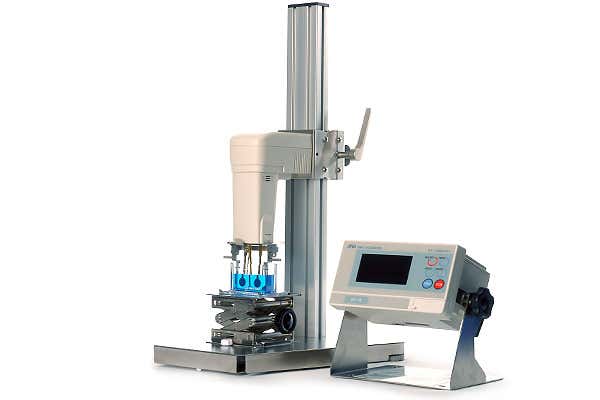Overview
Accurate viscosity measurements are vital for accurate size and zeta potential determination.
For size measurement the speed of Brownian motion is directly related to viscosity, so as this speed is used in DLS to determine the size, an error of 1% in the viscosity will lead to an error of 1% in the size reported.
For zeta potential measurement the viscosity of the dispersant is proportional to the viscosity, hence again a 1% error in the viscosity will lead to a 1% error in the reported viscosity. Since many additives such as surfactants, polymers and alcohols will significantly affect the sample viscosity, estimates of the viscosity can be inaccurate.
The SV-10 is a stand-alone accessory that is particularly useful for complex dispersants where there are no standard literature values for the viscosity available.
As measurements of size and zeta potential usually involve dilution of the sample, it is usually only necessary to measure the viscosity of the dispersant. This is particularly useful for dilute proteins as the buffers are usually available in large quantities.
The unit includes measurement cells for aqueous samples, glass cells for non-aqueous measurements and a thermostatically controlled cell holder for measurements at a defined temperature. A recirculating water bath is required for this, which is not included.
- Fast, continuous measurement of the viscosity of fluids from 0.3 to 10,000mPa.s. (cP).
- Compatible with any Newtonian liquid, aqueous and non-aqueous.
- 15 seconds for complete measurement.
- 1% accuracy.
- Automated 1 point calibration with water.
- Sample volume 10mL.
- PC software included for system control and continuous plotting of viscosity.
How it works
The SV-10 is a ‘vibro viscometer’, which uses vibrating paddles to measure the sample viscosity.
Two identical gold plated discs on supporting rods, arranged like a tuning fork, are lowered into the solution to be measured.
An actuator strikes the supports for the paddles, and this makes them vibrate at a frequency and displacement characteristic of the paddles. The viscosity of the solution dampens this vibration, and a sensor measures this reduction in displacement. The actuator then continuously strikes the paddles to maintain a constant displacement. The time taken to reach a stable value is less than 15 seconds. The current required by the actuator is measured and this is calibrated to give the viscosity.
For samples that are close to the viscosity of water, to reach 1% accuracy it is sufficient to use water to calibrate the system, and there is a single button method to simplify this. For measurement of a wide range of viscosities a multipoint calibration using standard oils is performed.
Specification
| System compatibility | Stand-alone measurement. |
|---|---|
| Sample compatibility | Any Newtonian liquid. |
| Measurement range | 0.3 – 10,000mP.s (cP). |

